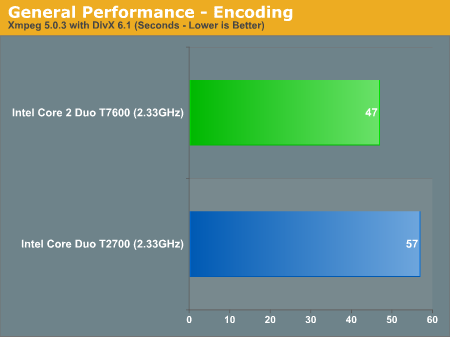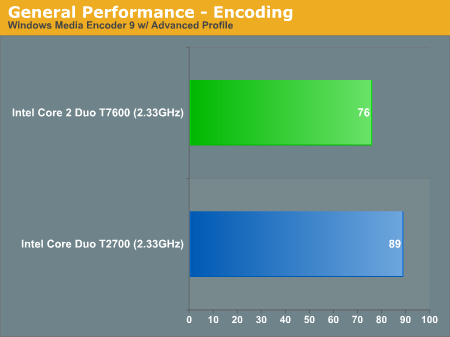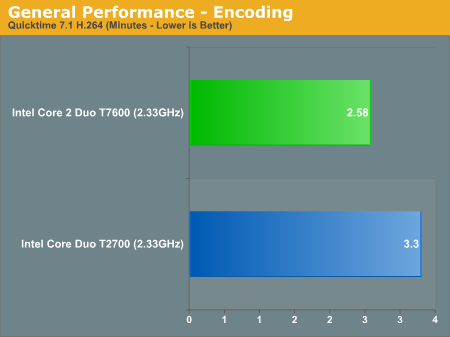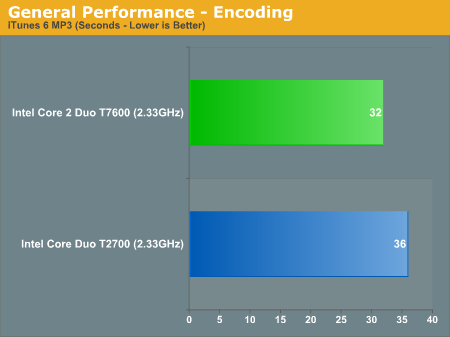Mobile CPU Wars: Core 2 Duo vs. Core Duo
by Anand Lal Shimpi on August 3, 2006 9:25 AM EST- Posted in
- CPUs
Encoding Performance using DivX 6.1, WME9, Quicktime (H.264) & iTunes
Multimedia encoding is typically a very good CPU benchmark, with performance that scales very nearly linearly with faster CPU clock speeds. Video testing was conducted using three popular codecs and applications: Xmpeg 5.03 with DivX 6.1, Windows Media Encoder with WMV9, and QuickTime 7.1 with H.264. The complexity of the encoding process increases as we move from DivX to WMV9, and H.264 encoding is in a league of its own in terms of the amount of CPU time required. Audio encoding performance was also tested using iTunes; MP3 encoding is less time-consuming and video encoding, but it continues to stress CPU performance.
Media encoding is a strong point of Intel's Core 2 Duo processors on the desktop, and the same holds true here on the mobile side:

DivX performance is improved considerably, with a 17.5% increase in performance at the same clock speed as Core Duo.

Windows Media Encoder 9 is really no different, showing a 14.6% performance advantage thanks to Core 2 Duo.

Our most strenuous encoding test, the Quicktime H.264 encode, is 21.7% faster with a Core 2 Duo installed than with a Core Duo running in our test notebook.

Even MP3 encoding is improved by 11.1% with the new chip.










46 Comments
View All Comments
IntelUser2000 - Saturday, August 5, 2006 - link
Correct. Lots of the benchmarks show 10% advantage for Core 2 Duo over Core Duo. The only 10% advantage 4MB L2 over 2MB L2 is in a single app.
bob661 - Thursday, August 3, 2006 - link
Video makes ALL the difference in the world.monsoon - Thursday, August 3, 2006 - link
I'm in the market for a mini PC to do video trancode, and I was considering the MEROM chip to compare to YONAH......in the end, given the right graphic card ( add ATI X1400 series or higher here ) with hardware embedded transcode features, i guess the YONAH fits my bill just right.
And i get to pay 100$ or 200$ less than the same computer with a MEROM which could not offer me better on the video side...
What do you think ?
bob661 - Thursday, August 3, 2006 - link
I would get the best video you can get with the cash saved from getting the Memron.Tiamat - Thursday, August 3, 2006 - link
Whats the difference between the Intel Core Duo T2300E* and the Intel Core Duo T2300E?I see a difference in price, but not specs. The page in the article does not address the asterisk...
Anand Lal Shimpi - Thursday, August 3, 2006 - link
The asterisk means that the CPU lacks support for Intel Virtualization Technology (VT). I had the note on Page 3 but I forgot to include it on Page 2 :) Thanks for the heads up :)Take care,
Anand